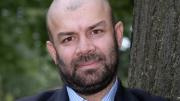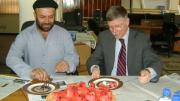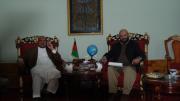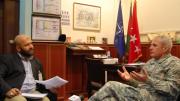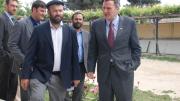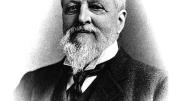In many ways, Afghanistan’s outlook is grim. The war with the Taliban drags into its tenth year, and is merely the latest episode of what can sometimes seem like a history of war interrupted by anomalous intervals of peace. To many Afghans, Hamid Karzai’s central government is illegitimate. Corruption is so deeply and widely ingrained that, according to one United Nations report, Afghans paid $2.5 billion, nearly a quarter of their GDP, in bribes in 2009.
Nonetheless, “in the last few years, one of the few bright spots is the media,” says Masood Farivar ’94. “The long-term role that media outlets play in terms of public education, unifying the country, offering people an outlet to air their differences rather than resorting to violence—these things are extremely important.”
To be sure, Farivar (fah-ree-var) has seen his share of violence. In Confessions of a Mullah Warrior (Atlantic Monthly Press, 2009), he describes two teenage years when he fought as a guerrilla against the Soviet occupation. But Farivar also calls himself a born optimist. “Afghans are believers, people of faith,” he says. “But the way things have been going for the last couple of years does not inspire a lot of confidence in the future. It might even drive some people to give up, and it’s important to prevent that. The negativity that you see so much of in the media can put journalists out of touch with their audience.”
Farivar is general manager of Salam Watandar (the phrase means, roughly, “Hello, countryman!”), a radio-program-producing organization that serves a network of 42 news-oriented stations around Afghanistan. It’s often called “the National Public Radio of Afghanistan,” with 10 million listeners (close to a third of the population) within broadcast range. Several of its affiliated stations rank at the top of their markets, and several more are the only radio stations in their areas. Four are completely female-staffed. Internews (www.internews.org), the international media-development organization that founded Salam Watandar, is considering not only spinning it off as an independent Afghan organization during the course of this year, but also launching a television version. (California-based Internews, founded in 1982, is a nongovernmental organization that has worked in more than 70 countries; major funding for its Afghanistan endeavors comes from the U.S. Agency for International Development.)
The media revolution in Afghanistan has been dramatic. In 2001, with the Taliban in charge, the country had only one radio station—the government-operated Voice of Sharia, dominated by Islamic programming—and television was banned. Today, dozens of radio, TV, and telecommunications antennae sprout from the highest point in Kabul, known as “TV Hill.” Around 80 percent of the nation’s households own radio receivers, and half that many have television sets. Afghanistan now boasts more than 300 print publications, more than 100 radio stations, and more than 30 television outlets. Because about three-quarters of the citizens are illiterate, radio, followed by TV, is the primary way Afghans get their news. “One problem is that each faction and each warlord tries to establish its own publication—TV, radio, or newspaper,” says Abdul Wahid, an Afghan and a current Nieman Fellow at Harvard. Since 2001, Wahid has worked as a Kabul-based local reporter for the New York Times. To have some kind of independent news medium like Salam Watandar, he says, “is extremely significant for the country.”
“Not a week goes by now without a radio station being set up somewhere in Afghanistan,” Farivar notes. “But given our tough terrain and geography, there is still no shortage of areas without access to independent media. They’re all FM stations, whose signals cover 40 to 60 kilometers from the source, and they are clustered in cities and small urban areas. Internews has always focused on underserved areas and remote parts of the country, so our stations are mostly in provinces and distant places where they’re often the sole source of news and information.”
Although Salam Watandar emphasizes news and public affairs, its programming runs the gamut. Farivar took six months to develop an agricultural version of Car Talk, National Public Radio’s long-running hit in which two brothers, Boston-based mechanics, banter with callers and solve auto problems. Their Afghan counterparts are not brothers, but “they have the right chemistry,” he says. “They’re very funny, entertaining, and extremely knowledgeable. That show is one of my proudest achievements—we’re going to take it on the road, and record it in the provinces.”
“No doubt we have one of the freest, if not the freest, press in the region,” Farivar adds. “Of course, governments, even democratically elected governments, don’t always like having a free press. It’s a tricky issue. There is some self-censorship, some lines you cannot cross. Islam is a subject that you cannot touch: you can’t piss off the mullahs, can’t offend people’s faith. And sometimes you can’t offend the powers that be. But Afghan journalists continue to push the envelope. The satire writers are at the forefront. We have a very funny satire show that takes on powerful people.It exposes fraud, ineptness, corruption. At times some satirists have landed in jail.”
Afghanistan is one of the world’s most challenging environments for journalists. “It can be a dangerous business to get into,” Farivar explains, “but there are far more dangerous places for journalists. After three decades of war, Afghan journalists have the street smarts to avoid getting killed.”
Shortly after Farivar arrived at Salam Watandar, a news anchor told him, “I can’t do this any more—everything I read is violence, bombs, explosions, suicide attacks. I’ve become numb.” Farivar condoled with the man, then told him, “‘There’s more to news than bombs and war. There is another aspect that’s not being reported—let’s also cover stories that give people hope.’ I’ve come to call it ‘the journalism of hope.’ In a country at war, journalists have a moral obligation to report on things that give people hope.”
Take sports. “This year, we carried the first-ever live radio broadcast of a cricket match in Afghanistan,” Farivar says. “Cricket is a big sport in South Asia: Afghan refugee kids brought it back from Pakistan. And Afghanistan has an up-and-coming team: they rose from number 130 in the world to number 14 in the span of 16 months—remarkable! We knew the broadcast would be well received, but we were not ready for the voracious response—during each match, hundreds would call us to cheer for the national team and to thank us. They couldn’t believe their ears. The moral of the story is that listeners are interested in hearing about more than violence. The calls we got came in from all over the country.”
When his predecessor suddenly departed in 2007, Farivar, with no radio experience, became general manager of Salam Watandar after only two months at the network. But he did have a strong track record in journalism, a Harvard education, and a native’s understanding of his country. Born in 1969 to a middle-class family (his father is a Soviet-educated Afghan, a petroleum engineer), at 13 he moved with his family to Pakistan as refugees from the Soviet invasion. Enrolled in a madrasah (religious school) there, he lived in two worlds, he says: the deeply religious one of his grandparents, and the far more secular one of his parents.
In 1987, at 18, he returned to Afghanistan to join the resistance as one of the anti-Soviet insurgents known as mujahedin. He was given a gun and participated in about a dozen hit-and-run guerrilla missions in the countryside over the next two years. “It was exciting, and frightening,” he recalls. “I also felt I had a mission and a duty to take part in a jihad for God and country. I was moved more by patriotic feelings than religious ones.
“That’s been the history of Afghanistan for 2,000 years: fighting off invaders,” he continues. “That lesson, unfortunately, has not been heeded by foreign forces with designs on Afghanistan. As soon as you’re seen as an occupation force, your future in Afghanistan is doomed.” Eventually, Farivar involved himself with a news-gathering outlet set up by the U.S. government (“Soviet atrocities were not getting enough exposure”) where he worked with other mujahedin as reporters—his first exposure to journalism.
A Briton of Greek descent, the late Carlos Mavroleon ’82, a convert to Islam who worked as a Wall Street trader before going to Afghanistan to join the mujahedin, met Farivar on a military operation and encouraged him to consider a Harvard education. He enrolled at the Lawrenceville School in New Jersey as a 20-year-old “postgraduate” student, and found the experience “overwhelming. The culture shock was immense.” There were many changes from the strict schooling he’d had in Pakistan. To take one small example, at the madrasah, he had never played sports, but at Lawrenceville he joined the track team (though he was too old to compete), and picked up Ultimate Frisbee.
In 1990, he arrived in Harvard Yard as a 21-year-old freshman. He did not see his homeland again until 1999. Harvard’s course catalog overwhelmed him with its richness and variety, a stark contrast with the narrower, far more prescriptive system in Afghanistan: “Amazingly, intellectually, I could pursue anything I wanted to,” he says. He concentrated in history and wrote his senior thesis on the Islamic influence on Saint Thomas Aquinas. He tried rugby and briefly joined the Harvard Republican Club. (“I liked Ronald Reagan. He was a staunch supporter of the Afghan cause.”) One summer, he worked for the Harvard Student Agencies’ travel guide Let’s Go—The Southwest United States.
Commencement Day in 1994 was anticlimactic, Farivar says: “I felt I had completed my American mission and would go home to serve. But in 1994 there was a vicious civil war in Afghanistan and it was too dangerous to go back.” (His parents and three sisters had relocated to England.) So he made a postgraduation choice that sounds classically American: he took a year off to drive cross-country with a classmate, doing things along the way like working at a youth hostel in Arizona.
In 1995, Farivar landed his first full-time job, with a news-sharing joint venture run by the Associated Press and Dow Jones, publisher of the Wall Street Journal, in New York City. Though the job was “the fastest track to becoming a foreign correspondent,” Farivar’s work visa didn’t allow him to go abroad on stories. He did the next best thing and covered the United Nations; he also wrote a daily column on the energy market for both the Journal and the Dow Jones news wires. His international background and language skills helped: in addition to English, he knows classical Arabic, Uzbek, Urdu, and the two Afghan national languages, Dari and Pashto. He spent 12 years as a single New Yorker, living in Brooklyn and then Jersey City, developing a good circle of friends, taking weekend jaunts outside the city, going to several World Series games, enjoying the nightlife, cultural life, and “great restaurants and bars.”
In 2007, he decided that he’d “better move back to Afghanistan now, or it wouldn’t happen.” There was some pressure from his family to marry, and after completing his book he finally returned to Kabul, taking a 25 percent pay cut to accept a job with Internews: teaching journalistic skills to young Afghan reporters. That soon morphed into his position at Salam Watandar. The next year he settled into an arranged marriage with his wife, Malalai. They named their son, born in 2010, after an American: “Muhammad Ali—The Greatest,” says Farivar. “He is one of my heroes, as an athlete and as a champion. Ali is very well known as a Muslim. We are a Muslim family, and I’m proud of it.”
Farivar’s assessment of his countrymen’s mood now is that “No one wants the Taliban back. That was a brutal regime. I think there’s still a great deal of support for the U.S. presence in Afghanistan. It’s important for American officials to separate the long-term civilian commitment to Afghanistan from the military involvement.”
Kabul, which he characterizes as a boom town, “goes through phases,” Farivar explains, “but it is generally not as dangerous as it seems from afar. The attacks you hear about are targeted, not random, so unless you’re in the wrong place at the wrong time, you’re generally safe. There was a major attack in January [2010] that happened less than a hundred yards from our office—of all the windows in the building, the only one blown out was in my office. I was woken up at 6:00 a.m. that day and directed the coverage from home. There was also a big attack on the Italians, only 150 yards away from where I live. I went home and found that all the windows on our block had been shattered. The window-makers made a killing that day.”
Yet life goes on. He used to put in 12-hour days; since his marriage, he has managed to cut them down only to 10- or 11-hour days, six days a week. “I gave up an active social life in New York, but it doesn’t bother me not to have much of a social life in Kabul—I went there to work,” he says. “I draw an enormous amount of satisfaction from my work. I feel I have the best job in the world, doing exactly what I always wanted to do. If we can, through our reporting and programming, put a smile on someone’s face or prevent a potential suicide bomber, or inspire hope in a young person, then we can go home at the end of the day feeling good about ourselves.”
